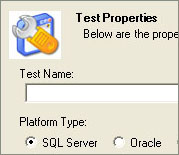Intel Xeon 3.6 2MB vs AMD Opteron 252 Database Test
by Jason Clark & Ross Whitehead on February 14, 2005 8:00 AM EST- Posted in
- IT Computing
SQL Stress Tool Benchmark
Our first benchmark was custom-written in .NET, using ADO.NET to connect to the database. The AnandTech Forums database, which is over 14GB in size at the time of the benchmark, was used as the source database. We'll dub this benchmark tool "SQL Stress Tool" for the purposes of discussing what it does. We have done some updates to the tool since we first used it; it now supports Oracle, and MySQL. We also adjusted the test time for this test and future tests to 20 minutes. The reason for this was to ensure that we used as much memory as possible for future planned 64 bit tests.
SQL Stress allows us to specify the following: an XML based workload file for the test, how long the test should run, and how many threads it should use in which to load the database. The XML workload file contains queries that we want executed against the database, and some random ID generator queries that populate a memory resident array with ID's to be used in conjunction with our workload queries. The purpose of using random ID's is to keep the test as real-world as possible by selecting random data. This test should give us a lot of room for growth, as the workload can be whatever we want in future tests.
Example workload:
Example Random ID Generator:
The workload used for the test was based on every day use of the Forums, which are running FuseTalk. We took the most popular queries and put them in the workload. Functions, such as reading threads and messages, getting user information, inserting threads and messages, and reading private messages, were in the spotlight. Each reiteration of the test was run for 20 minutes, with the first being from a cold boot. SQL was restarted in-between each test that was run consecutively.
The importance of this test is that it is as real world as you can get; for us, the performance in this test directly influences what upgrade decisions we make for our own IT infrastructure.











97 Comments
View All Comments
danidentity - Monday, February 14, 2005 - link
Jason, I hope you're ready for about 5 pages of comments pointing out the flaws in your testing methodology and another 5 pages demanding you re-do all the tests because the Opteron didn't destroy the Xeon.Fair warning. ;)
Jason Clark - Monday, February 14, 2005 - link
Tiamat, yep corrected. ThanksTiamat - Monday, February 14, 2005 - link
"Dual core Opterons will be socket compatible with existing 950 pin sockets that support 90nm (95W/80A)."Correct me if I am incorrect, did you mean 940 pin? If not, I have not seen any 950 pin sockets on the market...
Jason Clark - Monday, February 14, 2005 - link
Aileur, we'll get right on it.Jason Clark - Monday, February 14, 2005 - link
They are coming soon :) Derek Wilson is going to deliver those.Aileur - Monday, February 14, 2005 - link
Im afraid youre gonna have to redo this whole article since the opteron doesnt wipe the floor with the xeon, and this is unacceptable.Carfax - Monday, February 14, 2005 - link
Can you please do some Workstation benchmarks?It is rumored that AMD enhanced the SSE2 units aswell as added SSE3 support, and I want to see if it's true.